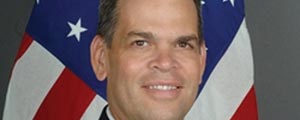
UNITED STATES ambassador to Zimbabwe, Bruce Wharton, has said his country was too pre-occupied with limiting the spread of communism to intervene in the Gukurahundi massacres which claimed an estimated 20 000 people from Matabeleland and Midlands in the 1980s. Report by Dumisani Sibanda Bureau Chief
Wharton made the remarks while addressing journalists at the Bulawayo Press Club on Tuesday.
“The Gukurahundi was a terrible tragedy, there is no question about it,” the US diplomat said.
“I don’t have detailed information about who did what to whom at that time. I can tell you that in the mid-1980s my government’s concern — big concern in the world not just in Africa — was limiting the spread of communism and that gave us a certain optic that directed our focus in ways that do not make much sense as they seemed to make in the 1980s. Times change. Objectives change. Policies change.” Critics of the US have often pointed to the superpower’s failure to act to stop Gukurahundi — which an international human rights body, Genocide Watch has classified as “genocide” — and failing to intervene in the Rwanda genocide pitting the Hutu against the Tutsi, as testimony that it is only motivated by its own interests to intervene in situations, rather than common good. However, Wharton urged people in Matabeleland not to give up the fight for justice on Gukurahundi. President Robert Mugabe described it as a “moment of madness in our history”.
“There is a historical record
. . . it’s a very complicated issue the people of Zimbabwe are going to have to sort out,” said Wharton.
“I am not quite sure what my government can do, but as we were speaking, the one thing that occurred to me was a quote from Martin Luther King which goes: ‘The arch of history is long but bends towards justice’. So don’t give up.” Answering a question on what the US would do on the blocking of MDC president Welshman Ncube from being sworn in as a principal in government — which the questioning journalist said was tribally motivated — Wharton said his country was trying to steer clear from specific internal political processes in Zimbabwe.
“I am doing my best to meet with people from all political parties in Zimbabwe,” he said.
- Chamisa under fire over US$120K donation
- Mavhunga puts DeMbare into Chibuku quarterfinals
- Pension funds bet on Cabora Bassa oilfields
- Councils defy govt fire tender directive
Keep Reading
“I think it is really important for my government not be seen to be in either one camp or another. We need to stand up for principles rather than specific parties or persons. So that’s my approach at this point. I try to be inclusive. The way the Global Political Agreement is negotiated among the people of Zimbabwe, who participates or who doesn’t, is not my business.”
Wharton said the US wanted to promote universally accepted democratic principles such as “upholding the rule of law”. “But when it comes to the complex political processes of Zimbabwe, I think that’s really not my business and probably something that I should not be involved in.”
He said the US foreign policy was guided by those “foundational values”, but adopted different approaches in its relations with various countries because of their differences in “history and culture” for instance.
“Human rights, respect for the rule of law, clear and transparent democratic policies are foundational values that guide US foreign policy. The values remain the same.” He said “democracy is the right of people to determine their destiny” and this inspired the US foreign policy.











